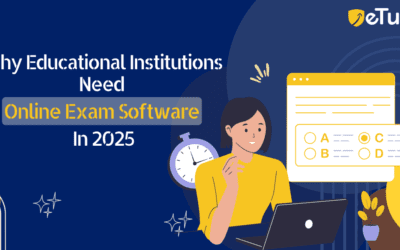Online Exam Software for IIT-JEE Mains and Advance

Table of Contents
ToggleIntroduction:
The Indian Institutes of Technology Joint Entrance Examination (IIT-JEE) is one of the world’s most prestigious and competitive entrance exams. Thousands of students aspire to secure a coveted seat in one of India’s top engineering institutions every year.
With the advent of technology, preparing for IIT-JEE Mains and Advance has transformed. Online exam software has emerged as a game-changer, making it easier and more efficient for students to prepare for this rigorous examination.
The shift towards online learning has become a prevailing trend, requiring students to evaluate their preparedness consistently. The demand for reliable Online Exam Software has grown exponentially in the education sector, especially for competitive exams like IIT-JEE Mains and Advance. A robust online test platform is essential for effectively assessing an aspirant’s readiness.
If you are considering creating or administering online exams for your students, especially for IIT-JEE Main, Mock Tests, or Advance Tests, assessment software for IIT-JEE is the ideal choice
With eTutor test software, you can streamline your examination processes, providing students with a seamless and efficient testing experience.
In this blog post, we will explore how online exam software has revolutionized IIT-JEE preparation and the process of using it effectively.
Online exam software for IIT-JEE Mains and Advance:
Online exam software is a digital platform designed to create, administer, and manage exams and assessments online. These platforms offer various features and tools to streamline the exam process, from test creation to grading and reporting.
Why eTutor online exams for IIT-JEE Mains and Advance
eTutor online exams for IIT-JEE Mains and Advanced can offer several advantages for both students and educational institutions:
Features of Online test series software for IIT-JEE Mains & Advance
Online test series software for IIT-JEE Mains and Advance should offer a wide range of features to prepare students for these highly competitive exams effectively.
Here are some key features that such software should ideally include:
How does Online Exam Software for IIT-JEE mains and advanced work?
Online exam software for IIT-JEE Mains and Advance offers a comprehensive platform that simplifies the exam creation, administration, and assessment processes. It ensures a secure and efficient way to conduct these highly competitive exams while also providing valuable insights to improve the educational experience for students and teachers alike.
Here’s how it typically works:
User Registration and Authentication:
User Dashboard:
Exam Creation:
Exam administrators or teachers create the exam by specifying details such as exam name, date, duration, and subject. They also upload questions, including multiple-choice (MCQs), numerical, and descriptive questions.
2 Lakhs+ sorted Question Bank:
Customization:
Security Measures:
Exam Distribution:
Taking the Exam:
Monitoring and Proctoring:
Auto-Scoring and Instant Feedback:
Results and Analytics:
Data Storage and Security:
Reporting and Analysis:
Feedback and Improvement:
Conclusion:
Online exam software for IIT-JEE Mains and Advanced provides invaluable support to educational institutions and colleges. It streamlines the examination processes, reducing administrative burdens and costs associated with traditional paper-based exams.
Moreover, it allows institutions to monitor and assess student performance efficiently, enabling them to make data-driven decisions for curriculum improvement and targeted interventions.
The secure and reliable nature of these platforms ensures the integrity of the assessment process, instilling confidence in educators and students.
Overall, eTutor online exam software plays a pivotal role in enhancing the effectiveness and efficiency of educational institutions in preparing students for the challenges of IIT-JEE Mains and Advance, ultimately contributing to the success of aspiring engineers.
Recent Posts
- How School ERP Software Maximizes Productivity and Minimizes Cost
- How Does ERP Software for Schools Help Educators?
- Why Educational Institutions Need Online Exam Software in 2025
- How Is AI-Based ERP Software Transforming School Administration?
- Latest IIT-JEE & NEET Exam Trends 2025 | Key Changes in JEE, NEET 2025 Exams By NTA







